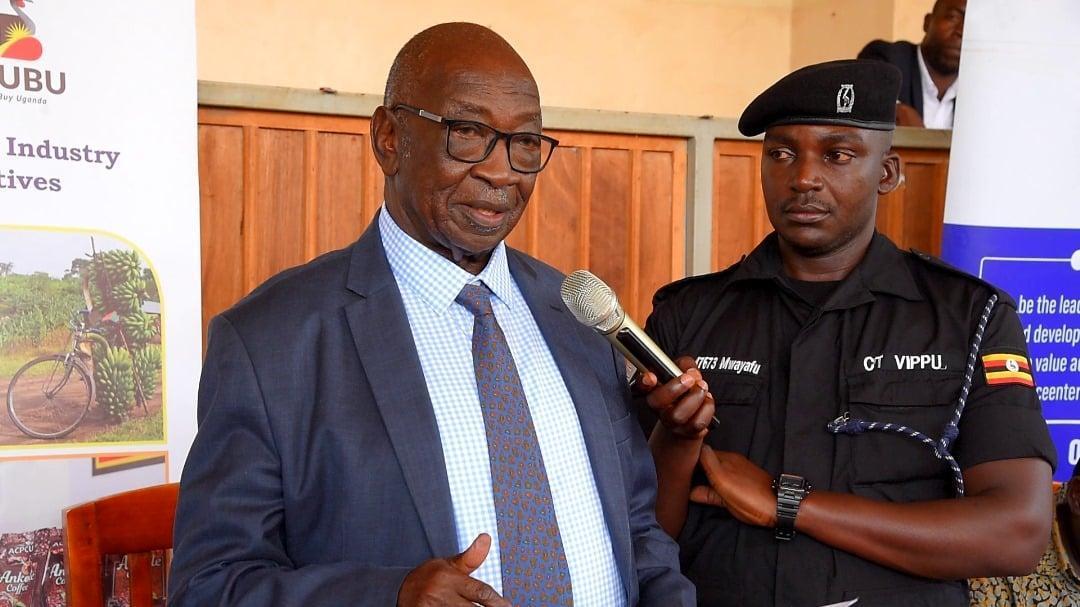Africa-Press – Uganda. Trade Minister Francis Mwebesa has sharply criticised the Uganda National Bureau of Standards (UNBS) over what he described as the harassment of small traders through selective enforcement of standards.
Speaking in Mbale City on Friday during national celebrations to mark the 9th International Day of Micro, Small and Medium Enterprises (MSMEs), the minister accused the standards body of misdirecting its efforts by targeting shopkeepers instead of regulating goods at the point of entry and production.
“They are supposed to support our people—not going around town like policemen, chasing people and closing shops,” Mwebesa said, drawing applause from hundreds of traders and entrepreneurs in attendance.
He questioned how fake goods bearing the official UNBS Q-mark end up on shelves, yet pre-inspection officers are paid to ensure compliance before the goods even enter the country.
“You cannot close someone’s entire business over one product out of a hundred. It is destructive. You are culpable,” the minister warned, urging the agency to redirect its efforts toward enforcement at the source and collaboration with manufacturers to address quality concerns before goods reach the market.
Mwebesa said that while government is committed to upholding product standards, the current approach risks hurting rather than helping small business owners, many of whom are still recovering from the economic effects of the COVID-19 pandemic.
His remarks come amid growing discontent from business communities across the country, who accuse UNBS of high-handed enforcement tactics that disproportionately affect small traders.
This year’s MSMEs Day was held under the theme “Empowering Uganda’s MSMEs for Sustainable Growth and Regional Competitiveness”, drawing national attention to the critical role of micro, small and medium enterprises in Uganda’s development.
“MSMEs contribute significantly to Uganda’s GDP. They are the backbone of our economy—driving employment, promoting exports, and spearheading innovation,” Mwebesa said.
He acknowledged the many challenges MSMEs face, including limited access to finance, markets, and modern technologies.
The minister reaffirmed government’s commitment to reviving the defunct Cooperative Bank to offer financial products tailored to the needs of MSMEs and cooperative societies.
While he noted that initiatives such as the Emyooga programme, the Parish Development Model (PDM), and the Small Business Recovery Fund are helping fill some financing gaps, he stressed that a dedicated financial institution for small enterprises is needed to drive real transformation.
The minister also spotlighted targeted interventions like the GROW initiative and the INVITE project.
He said the GROW initiative alone will support over 8,000 female-led enterprises, benefit at least 280,000 women entrepreneurs, and reach up to 1.6 million indirect beneficiaries. Through new investments under the INVITE project, the government anticipates creating over 200,000 new jobs.
Mwebesa further noted that Uganda is positioning its MSMEs to compete across regional and continental markets, revealing that local businesses have been facilitated to participate in the annual East African MSMEs Trade Fair.
Last year’s edition was hosted in Juba, South Sudan, and this year’s fair will be held in Nairobi, Kenya.
June 27 was declared International MSMEs Day by the United Nations General Assembly in 2017.
Now in its ninth year, the observance is meant to raise awareness about the vital role MSMEs play in national and global economic development, and their contribution to achieving the Sustainable Development Goals.
For More News And Analysis About Uganda Follow Africa-Press






